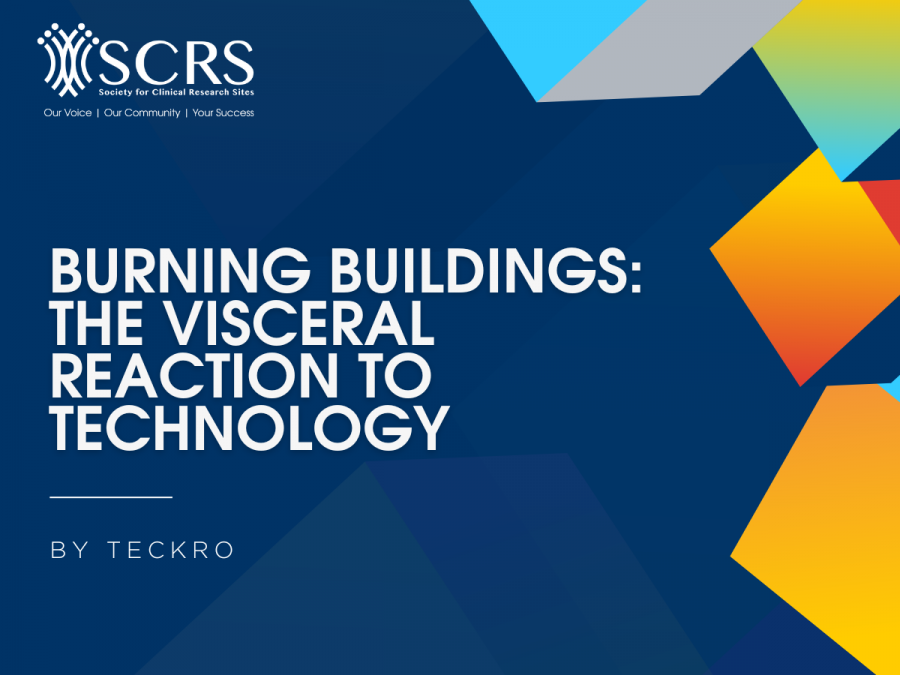Burning Buildings: The Visceral Reaction to Technology

Observations from the SCRS Global Site Solutions Summit
By Kelly Brown, Chief Marketing Officer, Teckro
At this year’s Global Site Solutions Summit hosted by the Society for Clinical Research Sites (SCRS), there were a few stand-out themes – workforce constraints, budgeting and contracting challenges, and the proliferation of technology in clinical research. It wasn’t just conversations about too much technology that struck me. It was the visceral, emotional expression of how this technology is affecting people.
For example, one of the main stage events was called “Tech or Terror: What Does the Exponential Increase in Technology Mean to Current & Future Operations of Research Sites?”. I’ll come back to some observations from the session in a minute, but the word choice of terror is a good example of what I mean about strong emotions.
Someone from a site network told me, “If (name redacted) were a building, I would light it on fire.” I’m not about publicly shaming anyone, so I’ll keep the vendor’s name to myself. Yet again, this is an example of anger and fury at things that are making life harder for research staff.
What worries me is that “technology” is a catch-all category for anything and everything digital. If we peel back the onion a bit, there are a few things that are muddying the waters when it comes to clinical trial technology.
Passwords Galore
Several people during the conference said how they wished there would be mergers and acquisitions because there are too many clinical trial technology vendors. I haven’t done a scientific analysis of the per capita vendors compared with other industries, but certainly there are a lot and constant newcomers trying to join the party.
Innovation comes by trying to make things better, but better is in the eye of the user. More vendors trying to innovate with solutions that improve clinical trial operations isn’t a bad thing. However, the unintended consequence is the number of different systems that research sites must manage by study and across sponsors. The proliferation of portals to log into and passwords to remember is at a point that is unsustainable for sites.
One solution I heard debated will make IT security people cringe: to have non-expiring passwords. I seriously doubt that muting password security gets to the heart of the problem and likely will introduce more issues.
Electronic Is Not Disruption
The clinical trial industry is an obvious target for disruption, which is why there are so many solutions out there. But one of the observations made during the “Tech or Terror” session is that, by and large, clinical trial technology is simply making physical, manual processes electronic. There really isn’t a substantial improvement in how things are done – so to “modernize” them with technology doesn’t really fix the core underlying issues.
Now, this “Tech or Terror” session was held in a ballroom and there were probably 100 people or more in the audience. The best indication of just how slow things are to evolve was about half of them are still using fax machines. Remember, fax machines were once innovative… decades ago.
Clinical trials are still dominated by paper-biased processes, which is a bit of a paradox because your average physician is rarely dealing with paper outside of research. Yet, I talked with an investigator who said he printed every electronic communication to sign and include in his investigator site files. During a session that I moderated about remote monitoring, there were discussions about documents being printed and then held up to a video camera for CRAs to visually inspect remotely.
Patients, Not Techies
Recall that workforce shortage was another topic of the conference. Just like many other industries, there simply aren’t enough qualified people. Research staff are being lured away for better pay, and CRAs are leaving the industry at an alarming rate.
So, it was shocking to me to hear that sites are investing in full-time positions to deal with tech support issues that patients have with their devices and apps. It’s no wonder that one of the research site owners that I talked with was adamant that he didn’t want anything to do with technology. He was lumping everything together and did admit his frustrations were with patient-facing technology.
Not all people in clinical trials are tech savvy – or even appreciate technology. There are clear use cases for patient solutions, such as capturing real-time data and simplifying the patient experience. However, the burden on sites to troubleshoot their patient technology is untenable.
Research Sites Take the Driver’s Seat
Technology is here to stay. Research sites recognize this and are hiring IT support. Some are also carving out IT budgets and deciding their own tech stack for themselves. As a business, this makes absolute sense.
Sites are pushing back. Some are refusing to use sponsor or CRO-mandated technology. Others are increasing the pass-through costs of technology training and enablement. For example, sites are spending between 10-20 hours per month per trial on training related to DCT technology, according to the annual SCRS site survey landscape. Sites are also declining studies due to unacceptable budgets, which also goes to the budget and contracting discussions during the conference.
In a risk-averse industry, the status quo is safest. And paper is the “safe” choice when it comes to audit and inspection readiness – or so the belief goes. This then lends itself to clinical trial operations stuck between modern and antiquated – and research staff caught in the middle. Giving sites the flexibility to decide their own technology is just one step in the right direction to advance drug development and clinical trials, ultimately better serving patients.
What’s Next
At Teckro, we support the SCRS initiatives to help navigate approaches to advancing clinical trial technology. To that end, we will be a major contributor to the new SCRS Tech West conference in June. We look forward to leading discussions that will align technology with the needs of the clinical research industry and what sites really want. We encourage as many stakeholders as possible from sponsors, vendors, CROs and sites to work with us and SCRS.



